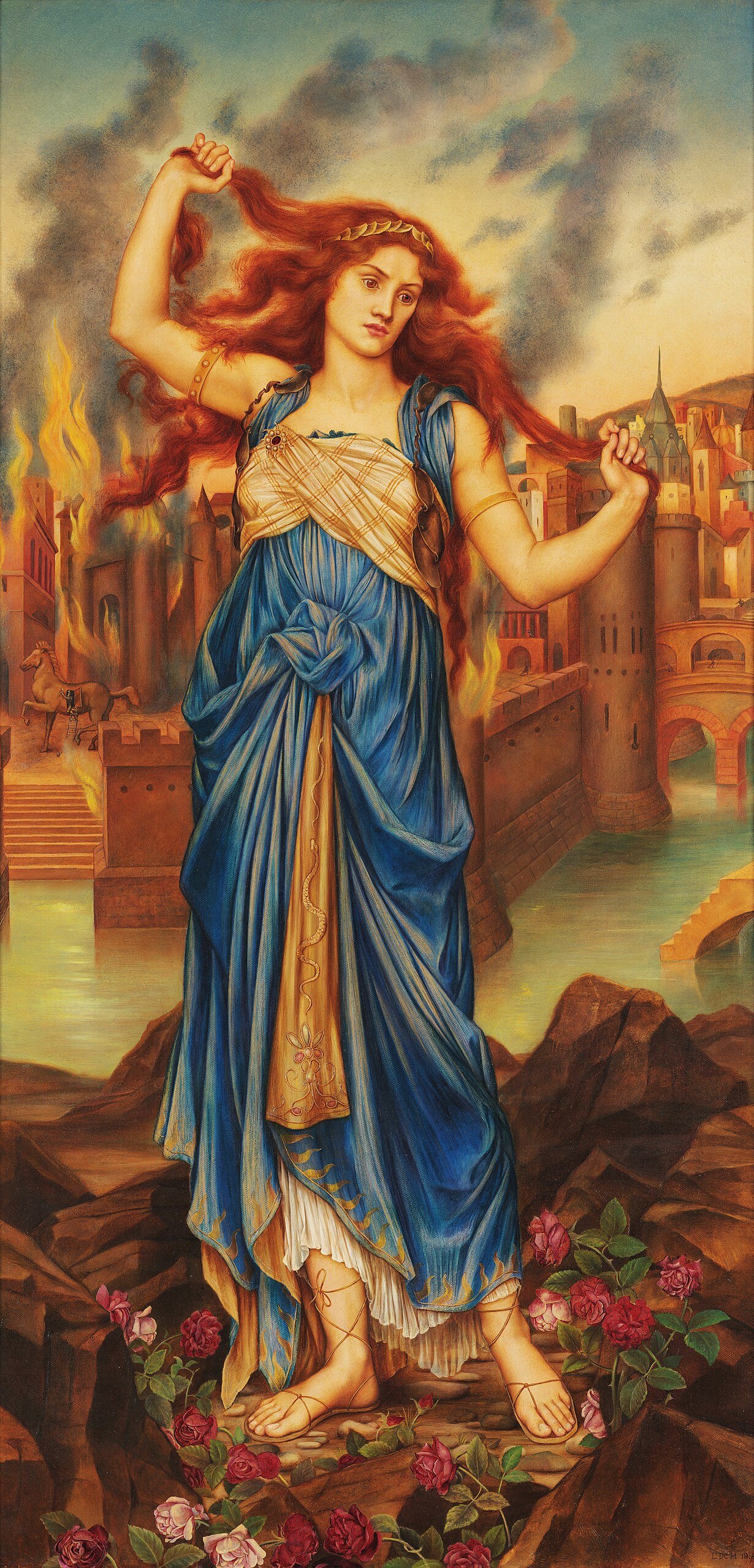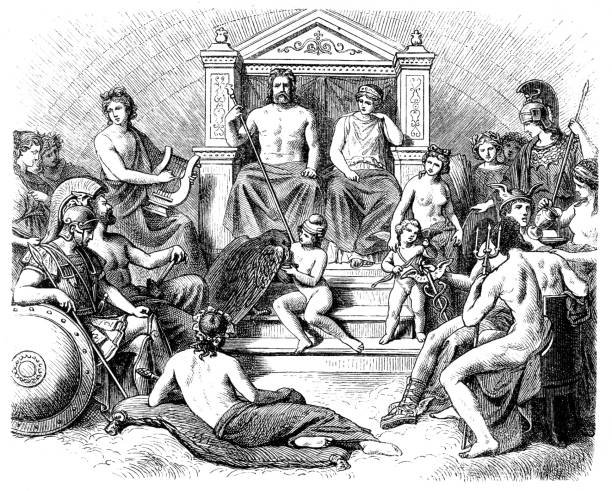Among the countless figures of Greek mythology, few embody tragedy as powerfully as Cassandra of Troy. She was a princess gifted with divine sight, a prophetess who could glimpse the future with unerring clarity. Yet, bound by a cruel curse, her voice became a lament echoing into the void: no one would ever believe her truths. The agony of Cassandra is not just a myth about the fall of a city—it is a haunting meditation on human blindness, ignored warnings, and the painful weight of knowledge unheeded.
Her story resonates across millennia because it touches something universal. How often do we ignore voices of reason, dismiss inconvenient truths, or fail to hear those who see danger ahead? Cassandra is not only a figure from Homer’s Iliad or Aeschylus’ Agamemnon—she is a timeless symbol of the struggle between foresight and disbelief, between truth and denial. To understand Cassandra is to step into one of mythology’s deepest tragedies, a tale where knowledge itself becomes a curse.
The Birth of a Princess of Troy
Cassandra was born into one of the most storied royal houses of antiquity. She was the daughter of King Priam, ruler of Troy, and Queen Hecuba, mother to many children who would shape the destiny of their city. Among her siblings were Hector, the noble warrior; Paris, whose judgment in a contest of goddesses sparked the Trojan War; and Polyxena, whose fate was no less tragic.
In this royal family, Cassandra was not merely a princess. She was a child who caught the attention of the gods. Apollo, the god of prophecy, light, and music, noticed her beauty and intelligence. Captivated by her, he offered her a divine gift: the ability to foresee the future. To accept such a gift was to step beyond the bounds of ordinary humanity, into a realm of both insight and isolation.
Apollo’s Gift and the Cruel Curse
The mythology surrounding Cassandra is layered with different versions, but most agree on one point: her fate was sealed by Apollo’s desire. The god granted her the power of prophecy in the hope that she would return his love. But Cassandra, whether out of piety, resistance, or independence, rejected him.
Enraged, Apollo could not revoke his gift—once bestowed, it was eternal. Instead, he twisted it into a curse. From that moment on, Cassandra would still see the future with perfect clarity, but no one would ever believe her words. Her warnings would be dismissed as madness, hysteria, or lies.
Thus, Apollo condemned Cassandra to live with the torment of foreknowledge without persuasion. Her mind became a prison of truths she could never share. This curse was not only divine vengeance but also a chilling metaphor for human existence: the anguish of insight without influence, of truth unheard in a world that prefers comforting illusions.
The Seer of Troy
Cassandra’s visions haunted her life, shaping her role in Troy’s destiny. She foresaw calamities long before they arrived. She warned her city against welcoming Paris back after he abducted Helen of Sparta, an act that would ignite the Trojan War. She cried out that the union would bring ruin upon their people, yet her warnings went unheeded.
During the war, her prophecies grew ever more desperate. She predicted the death of her beloved brother Hector, the destruction of Troy’s mighty walls, and the rivers of blood that would soak its streets. Again and again, her words were cast aside as ravings, her voice drowned in the noise of denial and pride.
Perhaps her most famous prophecy was about the Trojan Horse. When the Greeks appeared to abandon their long siege, leaving behind the massive wooden horse as an offering, Cassandra declared it a trap. She begged her people not to bring the ominous structure inside the city gates. Yet her pleas were ridiculed, dismissed as madness. The Trojans dragged the horse into the heart of their city, sealing their doom. That night, Greek warriors hidden inside emerged, opening the gates for their army. Troy was reduced to fire and ashes, just as Cassandra had foreseen.
The Fall of Troy Through Cassandra’s Eyes
The fall of Troy was not just a military defeat; it was the unraveling of Cassandra’s soul. She had seen it all before it happened: the flames consuming the towers, the cries of slaughtered children, the despair of her family. To watch a nightmare unfold exactly as she had foretold, powerless to stop it, was the essence of her curse.
In Aeschylus’ tragedy Agamemnon, Cassandra’s suffering is presented with heart-wrenching intensity. She is captured as a war prize and brought to Mycenae by Agamemnon, the victorious Greek king. There, standing outside the palace, she delivers a final series of prophecies. She foresees her own death at the hands of Clytemnestra, Agamemnon’s vengeful wife, and she knows that no one will heed her warnings. Her visions pour out like flames, and she accepts her fate with a terrible dignity. She steps into the palace, aware of her doom, and is slaughtered alongside Agamemnon.
Thus, Cassandra’s life ends as it began: with a voice of truth unheeded, her insight silenced by disbelief.
Cassandra and the Symbolism of Truth Ignored
Cassandra’s tragedy is not only a myth but a profound allegory. She represents the painful reality that truth is not always welcome. People often reject uncomfortable knowledge, preferring the comfort of denial to the sharpness of reality. Her story echoes in every ignored warning of history, in every voice silenced by disbelief or dismissal.
Psychologists and literary scholars speak of the “Cassandra Complex,” a term used to describe situations where warnings are ignored, often because the truth is too difficult to accept. Environmental scientists, for instance, have invoked Cassandra when discussing climate change—echoing her as they raise alarms about looming disaster, only to be dismissed by skeptics. Activists, whistleblowers, and visionaries often share Cassandra’s burden, speaking truths that others refuse to believe until it is too late.
Her curse is thus timeless. It is not only divine punishment in myth but also a mirror held up to human nature, reflecting our tendency to shut our ears to inconvenient truths.
The Humanity of Cassandra
Beyond the myth, Cassandra’s story is profoundly human. She was not just a symbol but a woman trapped in an unbearable fate. In her, we glimpse the loneliness of those who see what others cannot, the anguish of bearing knowledge that isolates rather than empowers.
Her rejection of Apollo, too, tells us something about her character. In refusing the god’s advances, she chose autonomy, dignity, and integrity over submission. Her curse was cruel, but it was also the price of her independence. In this sense, Cassandra embodies not only tragedy but also resistance—a woman who would not be controlled, even by a god.
Her life asks us: what is worse—to be blind to the future, or to see it with clarity yet remain powerless to change it?
Cassandra in Literature and Art
Cassandra’s voice has echoed far beyond the ancient world. Writers, poets, and artists across centuries have reimagined her story. In Aeschylus’ plays, she is the tragic prophetess doomed to walk knowingly into her death. In Euripides’ Trojan Women, she becomes a symbol of suffering in war, a voice of mourning for all the fallen.
Later, poets such as Christa Wolf and novelists like Marion Zimmer Bradley reinterpreted her, often emphasizing her strength, her intelligence, and her defiance. In modern psychology and culture, “Cassandra” has become a shorthand for ignored truth-tellers, from scientists warning of environmental collapse to voices raised against injustice.
Painters have depicted her as a figure of despair, clutching her temples in anguish, while others portray her as luminous, radiant with the fire of prophecy. In every age, artists return to Cassandra because her story feels urgently relevant.
The Echoes of Cassandra in Our World
The tragedy of Cassandra is not locked in the distant past. We live in an age full of Cassandra figures—scientists warning of pandemics before they strike, experts sounding alarms about climate crises, individuals speaking out about injustices ignored by those in power. Their voices are often dismissed, just as Cassandra’s was.
Her myth lingers because it reflects a timeless human failing: our unwillingness to listen until disaster is upon us. Cassandra reminds us of the cost of disbelief and the need to honor truth, even when it is uncomfortable.
Her story also speaks to the resilience of those who continue to speak, even when unheard. To bear the weight of truth without recognition is its own kind of heroism. In Cassandra’s suffering, we glimpse the courage of countless truth-tellers across history.
The Immortality of a Cursed Prophetess
Though Cassandra perished in Mycenae, her legacy has never died. She endures as a warning, a symbol, and an inspiration. She teaches us that knowledge without trust is agony, that foresight without belief is torment. But she also teaches us about dignity—the dignity of standing by truth even when the world denies it.
Cassandra’s voice may have been silenced in Troy, but across the centuries it still speaks. It whispers to us whenever we are tempted to ignore warnings, whenever we dismiss inconvenient truths, whenever we choose comfort over reality. Her story calls on us to listen—to see the value of those who foresee danger and to take seriously the fragile gift of foresight.
In this way, Cassandra is not only a prophetess of the past but a guide for the future. Her tragedy becomes our lesson: to believe before it is too late.






